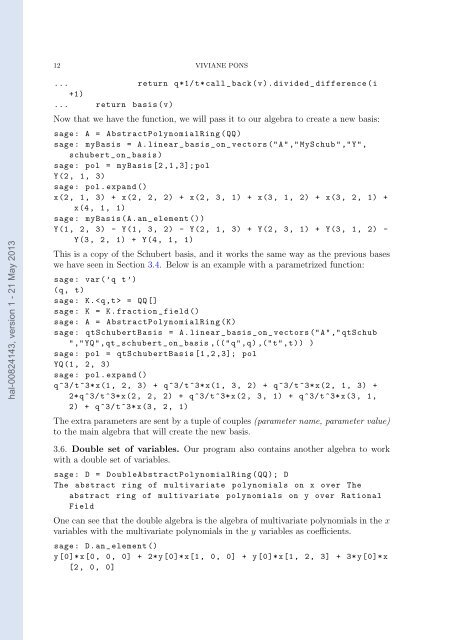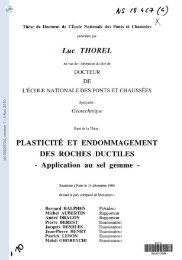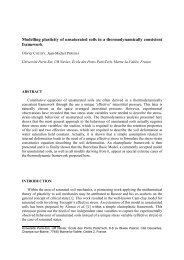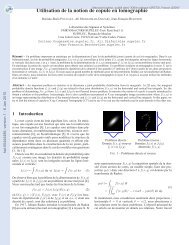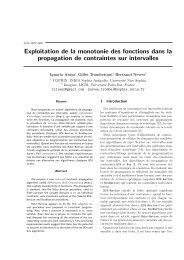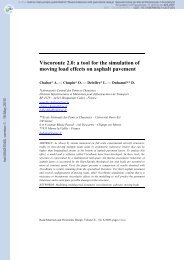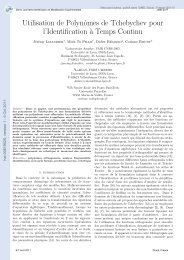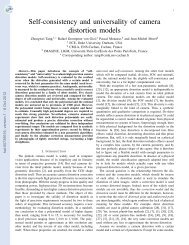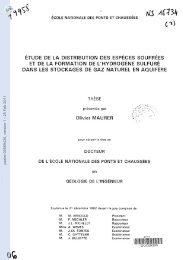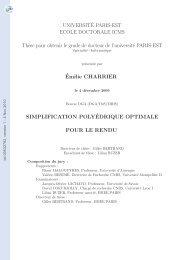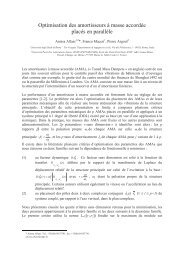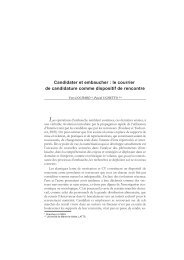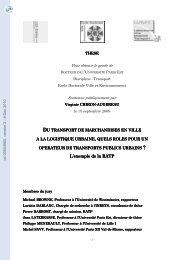MULTIVARIATE POLYNOMIALS IN SAGE
MULTIVARIATE POLYNOMIALS IN SAGE
MULTIVARIATE POLYNOMIALS IN SAGE
You also want an ePaper? Increase the reach of your titles
YUMPU automatically turns print PDFs into web optimized ePapers that Google loves.
12 VIVIANE PONS<br />
hal-00824143, version 1 - 21 May 2013<br />
... return q *1/ t* call _ back (v). divided _ difference (i<br />
+1)<br />
... return basis (v)<br />
Now that we have the function, we will pass it to our algebra to create a new basis:<br />
sage : A = AbstractPolynomialRing (QQ)<br />
sage : myBasis = A. linear _ basis _on_ vectors ("A"," MySchub " ,"Y",<br />
schubert _on_ basis )<br />
sage : pol = myBasis [2 ,1 ,3]; pol<br />
Y(2 , 1, 3)<br />
sage : pol . expand ()<br />
x(2 , 1, 3) + x(2 , 2, 2) + x(2 , 3, 1) + x(3 , 1, 2) + x(3 , 2, 1) +<br />
x(4 , 1, 1)<br />
sage : myBasis (A.an_ element ())<br />
Y(1 , 2, 3) - Y(1 , 3, 2) - Y(2 , 1, 3) + Y(2 , 3, 1) + Y(3 , 1, 2) -<br />
Y(3 , 2, 1) + Y(4 , 1, 1)<br />
This is a copy of the Schubert basis, and it works the same way as the previous bases<br />
we have seen in Section 3.4. Below is an example with a parametrized function:<br />
sage : var (’q t ’)<br />
(q, t)<br />
sage : K. = QQ []<br />
sage : K = K. fraction _ field ()<br />
sage : A = AbstractPolynomialRing (K)<br />
sage : qtSchubertBasis = A. linear _ basis _on_ vectors ("A"," qtSchub<br />
" ," YQ",qt_ schubert _on_basis ,((" q",q) ,("t",t)) )<br />
sage : pol = qtSchubertBasis [1 ,2 ,3]; pol<br />
YQ (1 , 2, 3)<br />
sage : pol . expand ()<br />
q ^3/ t ^3* x(1 , 2, 3) + q ^3/ t ^3* x(1 , 3, 2) + q ^3/ t ^3* x(2 , 1, 3) +<br />
2*q^3/ t ^3* x(2 , 2, 2) + q ^3/ t ^3* x(2 , 3, 1) + q ^3/ t ^3* x(3 , 1,<br />
2) + q ^3/ t ^3* x(3 , 2, 1)<br />
The extra parameters are sent by a tuple of couples (parameter name, parameter value)<br />
to the main algebra that will create the new basis.<br />
3.6. Double set of variables. Our program also contains another algebra to work<br />
with a double set of variables.<br />
sage : D = DoubleAbstractPolynomialRing (QQ); D<br />
The abstract ring of multivariate polynomials on x over The<br />
abstract ring of multivariate polynomials on y over Rational<br />
Field<br />
One can see that the double algebra is the algebra of multivariate polynomials in the x<br />
variables with the multivariate polynomials in the y variables as coefficients.<br />
sage : D.an_ element ()<br />
y [0]* x[0 , 0, 0] + 2*y [0]* x[1 , 0, 0] + y [0]* x[1 , 2, 3] + 3*y [0]* x<br />
[2 , 0, 0]


